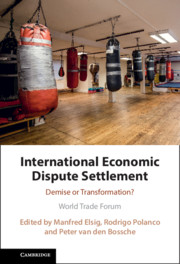Book contents
- International Economic Dispute Settlement
- International Economic Dispute Settlement
- Copyright page
- Contents
- Figures
- Tables
- Contributors
- Preface
- Abbreviations
- 1 Introduction
- 2 Contracting v. Multilateralism in Global Economic Governance
- Part I Current Challenges in International Trade Dispute Settlement
- Part II Current Challenges in International Investment Dispute Settlement
- 8 A Future Without (Treaty-Based) ISDS: Costs and Benefits
- 9 Investment Dispute Settlement à la carte: A Proposal for the Reform of Investor–State Dispute Settlement
- 10 Evidence-Guided Reform: Surveying the Empirical Research on Arbitrator Bias and Diversity in Investor–State Arbitration
- Part III New Issue Areas and Dispute Settlement
- Part IV Regional Approaches for International Economic Dispute Settlement
- Index
- References
10 - Evidence-Guided Reform: Surveying the Empirical Research on Arbitrator Bias and Diversity in Investor–State Arbitration
from Part II - Current Challenges in International Investment Dispute Settlement
Published online by Cambridge University Press: 07 August 2021
- International Economic Dispute Settlement
- International Economic Dispute Settlement
- Copyright page
- Contents
- Figures
- Tables
- Contributors
- Preface
- Abbreviations
- 1 Introduction
- 2 Contracting v. Multilateralism in Global Economic Governance
- Part I Current Challenges in International Trade Dispute Settlement
- Part II Current Challenges in International Investment Dispute Settlement
- 8 A Future Without (Treaty-Based) ISDS: Costs and Benefits
- 9 Investment Dispute Settlement à la carte: A Proposal for the Reform of Investor–State Dispute Settlement
- 10 Evidence-Guided Reform: Surveying the Empirical Research on Arbitrator Bias and Diversity in Investor–State Arbitration
- Part III New Issue Areas and Dispute Settlement
- Part IV Regional Approaches for International Economic Dispute Settlement
- Index
- References
Summary
As a diffuse, sprawling, relatively opaque and increasingly polarized legal order, the international investment regime, with its thousands of largely bilateral investment treaties, ad hoc system of adjudication – called investor–state arbitration or investor–state dispute settlement (ISDS) – and a decades-long legitimacy crisis and backlash against its practice make it a challenging phenomenon to accurately describe and assess. It also makes the identification and prioritization of its most problematic and reform-worthy areas of concern difficult to pin down. Without empirical data, the international investment regime has been, and to some degree continues to be, very susceptible to heuristics based on limited information, anecdote, and surface-level policy prescription.
- Type
- Chapter
- Information
- International Economic Dispute SettlementDemise or Transformation?, pp. 264 - 294Publisher: Cambridge University PressPrint publication year: 2021
References
- 1
- Cited by



